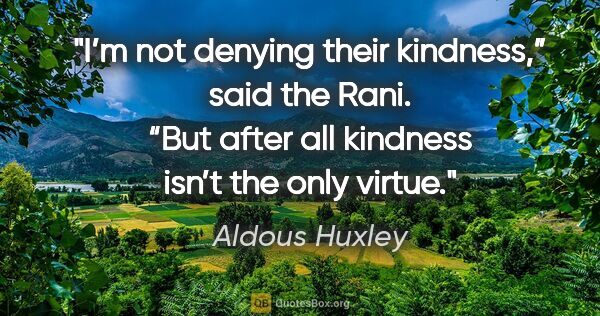Kindness Quotes (page 20)
I will say here and now that I have never discovered, nor can I see, any reasonable use or excuse for the? waynee, weedee, weekee? convention. It is not merely that I have a profound sympathy with one of my friends who says he just cannot believe that Caesar was the kind of man to talk in that kind of way. Caesar may, indeed, have done so, but what then ?
Dorothy L. Sayers
Don’t you see? It’s just not possible for one person to watch over another person forever and ever. I mean, suppose we got married. You’d have to work during the day. Who’s going to watch over me while you’re away? Or if you go on a business trip, who’s going to watch over me then? Can I be glued to you every minute of our lives? What kind of equality would there be in that? What kind of relationship would that be? Sooner or later you’d get sick of me. You’d wonder what you were doing with...
Haruki Murakami
I am malformed, scarred, and small, but . . .” she could see him groping “. . . abed, when the candles are blown out, I am made no worse than other men. In the dark, I am the Knight of Flowers.” He took a draught of wine. “I am generous. Loyal to those who are loyal to me. I’ve proven I’m no craven. And I am cleverer than most, surely wits count for something. I can even be kind. Kindness is not a habit with us Lannisters, I fear, but I know I have some somewhere. I could be . . . I could be...
George R. R. Martin
All stories are about battles, of one kind or another, which end in victory and defeat. Everything moves toward the end, when the outcome will be known. Poems, regardless of any outcome, cross the battlefields, tending the wounded, listening to the wild monologues of the triumphant or the fearful. They bring a kind of peace. Not by anaesthesia or easy reassurance, but by the promise that what has been experienced cannot disappear as if it had never been. Yet the promise is not of a monument....
John Berger
There used to be two kinds of kisses: First when girls were kissed and deserted; second, when they were engaged. Now there's a third kind, where the man is kissed and deserted. If Mr. Jones of the nineties bragged he'd kissed a girl, everyone knew he was through with her. If Mr. Jones of 1919 brags the same, everyone knows it's because he can't kiss her any more. Given a decent start any girl can beat a man nowadays.
F. Scott Fitzgerald
Heather Badcock meant no harm. She never did mean harm, but there is no doubt that people like Heather Badcock (and like my old friend Alison Wilde), are capable of doing a lot of harm because they lack - not kindness, they have kindness - but any real consideration for the way their actions may affect other people. She though always of what an action meant to her, never sparing a thought to what it might mean to somebody else.
Agatha Christie
Oh, my God. It hit me like a tsunami then: how perfect he was for me, how he was everything I could possibly hope for, as a friend, boyfriend - maybe even more. He was it for me. There would be no more looking. I really, really loved him, with a whole new kind of love I'd never felt before, something that made every other kind of love I'd ever felt just seem washed out and wimpy in comparison. I loved him with every cell in my body, every thought in my head, every feather in my wings, every...
James Patterson

The real trouble is that 'kindness' is a quality fatally easy to attribute to ourselves on quite inadequate grounds. Everyone feels benevolent if nothing happens to be annoying him at the moment. Thus a man easily comes to console himself for all his other vices by a conviction that 'his heart's in the right place' and 'he wouldn't hurt a fly,' though in fact he has never made the slightest sacrifice for a fellow creature. We think we are kind when we are only happy: it is not so easy, on the...
C. S. Lewis
Dissident Natan Sharansky writes that there are two kinds of states -- "fear societies" and "free societies," two kinds of consciousness. The consciousness derived of oppression is despairing, fatalistic, and fearful of inquiry. It is mistrustful of the self and forced to trust external authority. It is premised on a dearth of self-respect. It is cramped. In contrast, the consciousness of freedom is one of expansiveness, trust of the self, and hope. It is a consciousness of limitless...
Naomi Wolf
